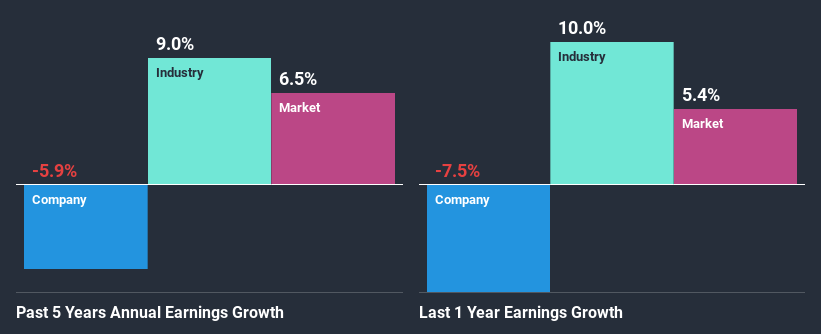- Taiwan
- /
- Electronic Equipment and Components
- /
- TPEX:6156
Is The Market Rewarding Song Shang Electronics Co.,Ltd. (GTSM:6156) With A Negative Sentiment As A Result Of Its Mixed Fundamentals?
Song Shang ElectronicsLtd (GTSM:6156) has had a rough three months with its share price down 10%. We, however decided to study the company's financials to determine if they have got anything to do with the price decline. Fundamentals usually dictate market outcomes so it makes sense to study the company's financials. Particularly, we will be paying attention to Song Shang ElectronicsLtd's ROE today.
Return on equity or ROE is an important factor to be considered by a shareholder because it tells them how effectively their capital is being reinvested. Put another way, it reveals the company's success at turning shareholder investments into profits.
Check out our latest analysis for Song Shang ElectronicsLtd
How Do You Calculate Return On Equity?
Return on equity can be calculated by using the formula:
Return on Equity = Net Profit (from continuing operations) ÷ Shareholders' Equity
So, based on the above formula, the ROE for Song Shang ElectronicsLtd is:
8.1% = NT$133m ÷ NT$1.6b (Based on the trailing twelve months to September 2020).
The 'return' is the profit over the last twelve months. So, this means that for every NT$1 of its shareholder's investments, the company generates a profit of NT$0.08.
Why Is ROE Important For Earnings Growth?
We have already established that ROE serves as an efficient profit-generating gauge for a company's future earnings. Based on how much of its profits the company chooses to reinvest or "retain", we are then able to evaluate a company's future ability to generate profits. Assuming everything else remains unchanged, the higher the ROE and profit retention, the higher the growth rate of a company compared to companies that don't necessarily bear these characteristics.
A Side By Side comparison of Song Shang ElectronicsLtd's Earnings Growth And 8.1% ROE
When you first look at it, Song Shang ElectronicsLtd's ROE doesn't look that attractive. Next, when compared to the average industry ROE of 10%, the company's ROE leaves us feeling even less enthusiastic. Therefore, it might not be wrong to say that the five year net income decline of 5.9% seen by Song Shang ElectronicsLtd was probably the result of it having a lower ROE. We reckon that there could also be other factors at play here. Such as - low earnings retention or poor allocation of capital.
So, as a next step, we compared Song Shang ElectronicsLtd's performance against the industry and were disappointed to discover that while the company has been shrinking its earnings, the industry has been growing its earnings at a rate of 9.0% in the same period.

Earnings growth is a huge factor in stock valuation. The investor should try to establish if the expected growth or decline in earnings, whichever the case may be, is priced in. Doing so will help them establish if the stock's future looks promising or ominous. One good indicator of expected earnings growth is the P/E ratio which determines the price the market is willing to pay for a stock based on its earnings prospects. So, you may want to check if Song Shang ElectronicsLtd is trading on a high P/E or a low P/E, relative to its industry.
Is Song Shang ElectronicsLtd Using Its Retained Earnings Effectively?
Song Shang ElectronicsLtd's low three-year median payout ratio of 24% (implying that it retains the remaining 76% of its profits) comes as a surprise when you pair it with the shrinking earnings. This typically shouldn't be the case when a company is retaining most of its earnings. It looks like there might be some other reasons to explain the lack in that respect. For example, the business could be in decline.
In addition, Song Shang ElectronicsLtd has been paying dividends over a period of five years suggesting that keeping up dividend payments is preferred by the management even though earnings have been in decline.
Conclusion
On the whole, we feel that the performance shown by Song Shang ElectronicsLtd can be open to many interpretations. While the company does have a high rate of profit retention, its low rate of return is probably hampering its earnings growth. Wrapping up, we would proceed with caution with this company and one way of doing that would be to look at the risk profile of the business. Our risks dashboard would have the 2 risks we have identified for Song Shang ElectronicsLtd.
If you decide to trade Song Shang ElectronicsLtd, use the lowest-cost* platform that is rated #1 Overall by Barron’s, Interactive Brokers. Trade stocks, options, futures, forex, bonds and funds on 135 markets, all from a single integrated account. Promoted
New: Manage All Your Stock Portfolios in One Place
We've created the ultimate portfolio companion for stock investors, and it's free.
• Connect an unlimited number of Portfolios and see your total in one currency
• Be alerted to new Warning Signs or Risks via email or mobile
• Track the Fair Value of your stocks
This article by Simply Wall St is general in nature. It does not constitute a recommendation to buy or sell any stock, and does not take account of your objectives, or your financial situation. We aim to bring you long-term focused analysis driven by fundamental data. Note that our analysis may not factor in the latest price-sensitive company announcements or qualitative material. Simply Wall St has no position in any stocks mentioned.
*Interactive Brokers Rated Lowest Cost Broker by StockBrokers.com Annual Online Review 2020
Have feedback on this article? Concerned about the content? Get in touch with us directly. Alternatively, email editorial-team (at) simplywallst.com.
About TPEX:6156
Song Shang ElectronicsLtd
Manufactures and sells electronic components and related products.
Excellent balance sheet second-rate dividend payer.
Similar Companies
Market Insights
Community Narratives




